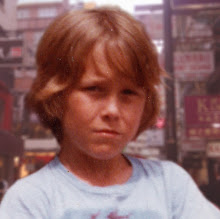Most marketing creates nothing. It generally does not innovate or have original ideas. It follows trends and apes the fashionable style, holding a mirror up to society that reflects what we were doing five minutes ago. The 1968 Beatles film Yellow Submarine brought the psychedelic art style of the sixties to mainstream attention, and commercial art felt the influence for the entire decade of the 1970's.
When talking about the "Cosmic Art" from the 60's, people mostly attribute the style to Peter Max. While his name is the most famous from the movement, it's not entirely clear that he invented it. There seems to be a bit of argument as to who came first, but these names rise to the surface: Peter Max and Heinz Edelmann. Edelmann was the art director on Yellow Submarine.
My first example of the Max / Edelmann style of illustration is the board game Payday, from 1975. Lame, I know, but I wasn't even born when Yellow Submarine came out. So, yeah, when I wind back the mental VCR to my earliest impression of 1970's cosmic art style, I get this on the screen:
This Dixie Cups ad is a fairly weak example of the Max / Edelmann style. It only borrows the bright watercolor rendering and bulbous, simple line work from the cosmic style. generally, the execution seen in the Dixie ad looks kind of... uuh... amateur, like a kid in junior high saw Yellow Submarine on OnTV and had a go at it himself.
I don't see Dixie cups around much anymore. This may be because I'm no longer a kid, but I don't see them around my friends' houses who have kids. In the 70's, Dixie cup dispensers were frikking everywhere. For those who don't know, a Dixie cup dispenser is a plastic cylinder stuck to your wall (usually near a sink) with an adhesive pad. It was always an act of shortsightedness. Within a few months, you got tired of buying the waxed paper cups to refill the thing, and it hung, abandoned, on your wall until eventually you got sick of looking at it and tried to tear it off. Good luck. The stretchy foam of the sticky pad was damn near impossible to remove completely, and you were likely to tear up the surface of the wall in the attempt. Throwing away a paper cup every time you have a drink of water is a huge waste, and most people decided it was better to use a washable cup. So long as they remembered to wash it, transmission of ringworm and trenchmouth wasn't a big problem.




























































